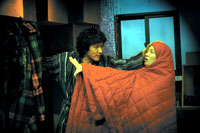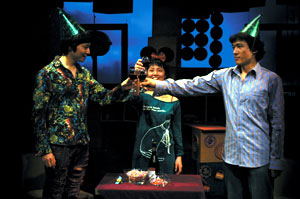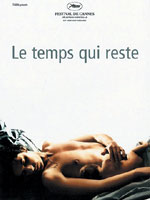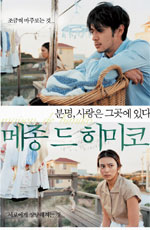The play Beautiful Sunday is full of joy and warmth creating a wholesome image
HI HI hi, beautiful Sunday/ This is my my my beautiful day As the lyrics of "Beautiful Sunday," Sunday is a day of blessing for most people as they eagerly wait for it with anticipation of how to spend their time away from school or work. They may not exactly know what they will do but it's clear that people tend to imagine something great because it's Sunday. Now, there's a play that expresses the freshness of a Sunday afternoon in the spring. 
▲ Eun-woo and Jung-joon bring about conflict from the beginning.
A popular Japanese play
Beautiful Sunday originates from the play by Japanese playwright Nakatani Mayumi, famous for the drama Water Boys. This play was initially performed in Tokyo in 2000 and immediately gained popularity among audiences and critics alike. It is, however, the first time for this play to be performed in Korea. Featuring a gay couple and a woman, the writer tries to show not only the delicate perspectives of the characters, but also insight into the various emotions of love and endings. The play attempts to alter stereotyped view of homosexuality. Directed by Kim Bo-kyung, performed by Hanyang Repertory, this play is held at the Hanyang Repertory Theatre in Daehak-ro.
Warm affection on a Sunday
The play begins with a woman and man in bed on a Sunday morning although they do not know each other; they don't even know why they are in the same bed. Jung-joon is so surprised to see the unfamiliar woman, but Eun-woo wakes up and introduces herself as a former resident of the house where Jung-joon now lives. She even ends up staying there for the rest of the day. This Sunday is special for Jung-joon because it is his third anniversary of cohabitation with Joon-suk, his boyfriend. After Joon-suk comes home, the three begin to understand each other through revealing their past wounds. Eun-woo had been hurt from a forbidden love with a married man and Jung-joon and Joon-suk, even though they ignore the negative social attitudes they receive, they still seem to suffer. Although Jung-joon doesn't identify himself as gay, he wants to go back to his hometown with Joon-suk. Joon-suk is reluctant about his proposal because he is HIV-positive. Even though their wounds are not healed in one day, they share the most beautiful day of their lives and end the day with a small party full of hope.
Fascinated from the first moment 
▲ Three characters have their own Sunday party.
The director of Beautiful Sunday, Kim Bo-kyung, was originally an actress. She states that when she first read the script of this play, she was strongly attracted to it. "It was interesting and funny, but beyond that, I was also fascinated by the fact that it involves seriousness and depth towards life. It was obvious that the writer tried to touch on the human reality and describe the characters warmly."Although this is her debut as a director, she provides strong direction and creates a natural atmosphere. She says this play is just like a "Sunday" for her. "Although I felt lacking in some technical aspects, I didn't feel too pressured. I just directed comfortably as if I were taking a rest on a Sunday," she explains. In addition, considering the themes, the director attempted to approach and understand the internal characteristics of a gay couple without prejudice. "During the preparation period, I watched many movies to help me understand the characters. I acquired consultation from gay friends by observing their behavior. Through this process, I could understand them better and after I showed them the play, they thanked me for describing the reality of their lives. I also learned it is not important whether the characters are gay or not, people all share similar joy and sorrow."
Unusual but delightful
Currently, Japanese literature and movies are popular and have characteristics that can only be found in Japanese culture. Originating from a Japanese playwright, this play also contains innate Japanese qualities. First, the characters seem to have jumped out of the pages of a comic book. Attentive and earnest Jung-joon, pure and delicate Joon-suk, open and honest Eun-woo are well-reflected in their behavior, so it gives a three-dimensional feeling to the audience. Besides, the exaggerated behavior adds to the comic-like atmosphere. Second, several situations exist that are different from the usual Korean comedic style. For example, Beautiful Sunday brings out chuckles and belly laughs in a way that can easily be found in Japanese movies. For example, the situation where the characters cheerfully sing a comic song celebrating the anniversary of living together contains unfamiliar comedic styles. Though it may seem strange to an audience who doesn't often see Japanese movies, it provides a new form of joy. Finally, the play has delicate and philosophical words that could also be found in Ekuni Gaori's novels, another famous author known for her soft emotional writing style. This point contributes to the balance of cheerfulness and depth. With only the use of words, the play is delivered with a lyrical feel. For example, the lines "There is no magnitude in worry. Every worry hurts everyone," or "I won't say goodbye at all even if stars in the sky fall upon us," show the subtle emotion and feeling of the characters. These feelings are also well communicated- to the audience.
Coming closer to life
The play doesn't end with a dramatic, exaggerated or fantastic conclusion. Instead, it chooses a simple, silent and ambiguous ending. Although it seems incomplete, the play succeeds in perpetuating a realistic atmosphere, as well as keeping a natural feeling. "I was fascinated by the characters finding the truth from their common experience as people. I think the story ends leaving the audience contemplating their own experience." As Kim says, our lives are full of uncertain situations and results, but if we try to find some comfort in every moment, we can be happier and make us smile more, even though life isn't as dramatic as in movies or plays. That is probably why this play has been loved by so many.
Life through gay characters

Time to Leave (Directed by Francois Ozon)
The story of a gay fashion-photographer who has been told he will die within three months. This movie meditates silently about the life, love and death of the character. The last scene describes death by using a fade out technique and wave sounds which create the feeling of a heartbeat.

Brokeback Mountain (Directed by Ang-Lee)
A love story of two cowboys and their experiences during summer that extends into decades. Their friendship-like love or love-like friendship is described sensibly and calmly. You shouldn't miss the last scene when the Jack, the cowboy, declares his love

Maison de Himiko (Directed by Isshin Inudo)
This movie is about the "friendship" between a girl and gay community. You can feel the director's affection toward those who are outcasted. The characters are so cute that you can't help smiling.
| The Play Beautiful Sunday March 2 ~ May 21, 2006 Hanyang Repertory Theater, Daehakro ₩25,000 |

